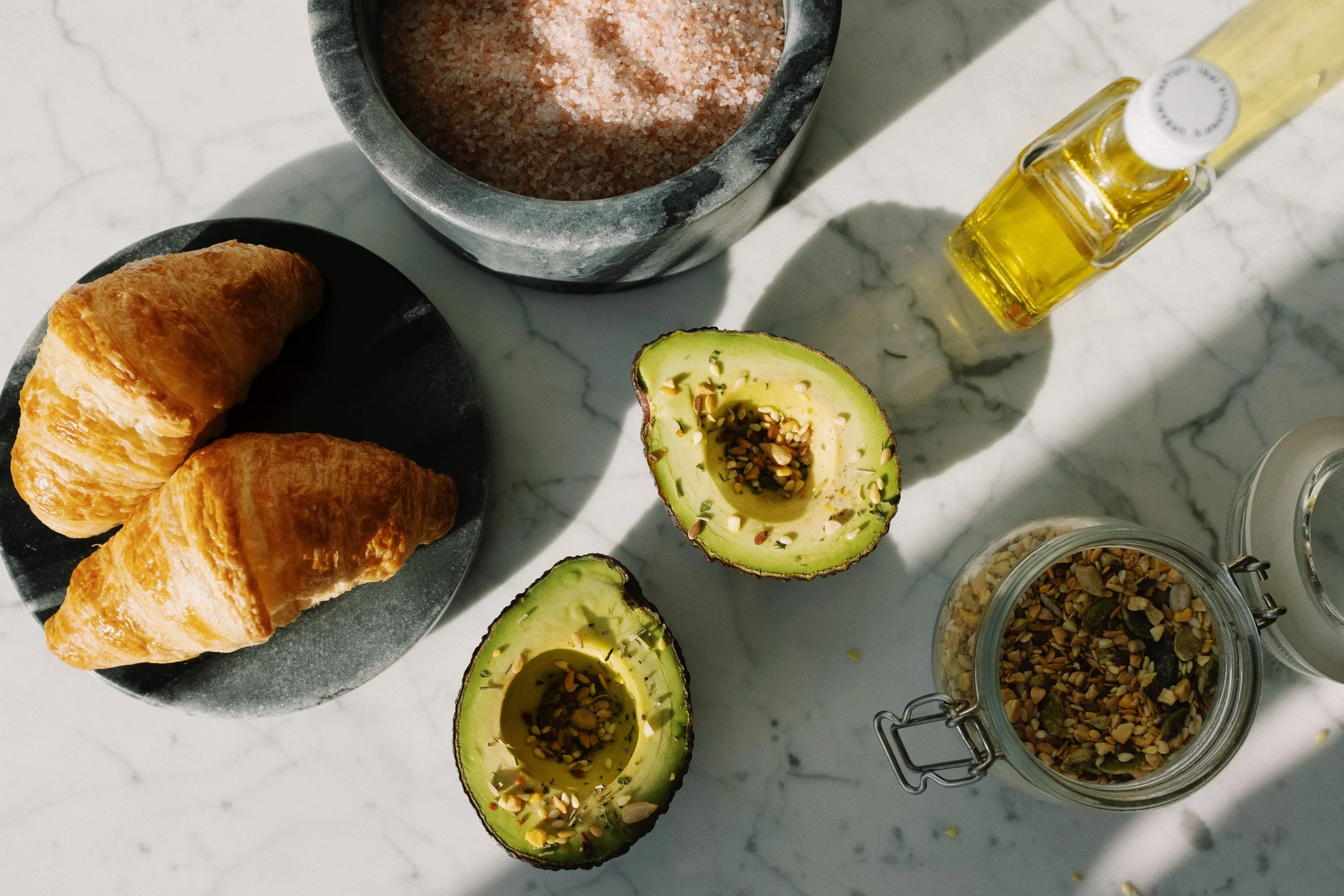Exploring the Impact of Dietary Fats on Inflammatory Bowel Disease
Dietary fats are an integral part of our diets and we need to eat them to keep our bodies healthy. For individuals living with Inflammatory Bowel Disease (IBD), the amount and types of fat eaten may impact their gastrointestinal symptoms and inflammation. Inflammatory Bowel Disease is an umbrella term that describes two different conditions, Crohn’s Disease and Ulcerative Colitis, which both cause inflammation in the gastrointestinal tract. In this blog, we will explore the research that looks at dietary fat intake and IBD. Let’s start by getting acquainted with some common types of dietary fats.
Monounsaturated Fats: These are unsaturated fats that are heart healthy. Good sources of monounsaturated fats include olive oil, canola oil, avocados and their oil, peanut oil, high-oleic safflower oil, and high-oleic sunflower oil.
Omega-3 Fatty Acids: Omega-3 fat is considered essential, meaning our bodies need it but cannot make it, therefore it needs to be consumed through the diet. Getting an adequate amount of Omega-3 in the diet reduces the risk of cardiovascular disease, helps to lessen inflammation in the body, helps to lower triglycerides (type of fat) in the blood, among other things. Good sources of Omega-3 fats include fatty fish such as salmon, tuna, mackerel, herring, sardines, as well as mussels, oysters, hemp hearts, flax, and walnuts.
Omega-6 Fatty Acids: Omega-6 fats are also considered essential and need to be acquired through the diet. Omega-6 fatty acids are quite abundant in our diets and are considered to be heart healthy. They are also an important component in the structure of our cell membranes. Good sources of Omega-6 fat include sunflower oil, safflower oil, corn oil, cottonseed oil, soybean oil, nuts and seeds.
Saturated Fats: Sources high in saturated fats include fattier meats and processed meats, higher fat dairy products, pastries, some packaged snack foods, coconut oil, and palm oil. High intake of saturated fats can increase LDL (bad) cholesterol in the blood.
Trans Fats: Eating artificially produced trans fats can also raise LDL (bad) cholesterol in the blood. In Canada, the use of artificial trans fats in commercial foods has been banned. Trans fats occour in small amounts in fried foods when oil is heated to high temperatures and reused. It is recommended to avoid trans fats, as research for their negative health effect is strong. Natural trans fats found in dairy products and meats of ruminant animals don’t seem to have the same negative impact on our health.
What the Research Shows About Dietary Fat Intake and IBD
So which types of fat should individuals living with Inflammatory Bowel Disease (IBD) be focused on consuming, and which should be limited? Should the focus be different from general heart healthy eating guidelines? Let’s take a look at what the research to date is showing.
Research suggests that dietary fats can have an impact on the risk of developing Inflammatory Bowel Disease (IBD). Studies have examined the effect of fat intake on the risk of developing IBD and found that high fat diets, and diets high in polyunsaturated fats (PUFAs) and Omega-6 fats were associated with an increased risk of developing both Crohn’s Disease and Ulcerative Colitis (1, 2, 3). Consuming large amounts of Omega-6 fats is thought to have pro-inflammatory effects by impacting the Omega-6 - Omega-3 ratio in the body. Generally, ‘Westernized’ diets tend to be overly rich in Omega 6 fats, which can alter the balance of Omega-6 and Omega-3 fats in the body to a ratio that is less advantageous for maintaining health (4). The ESPEN clinical guidelines for nutrition in IBD recommend a diet rich in Omega 3 fats, and lower in Omega 6 fats, however Omega-3 supplements have not been shown to be beneficial in helping individuals with IBD maintain remission (2, 5).
When looking at total fat consumption and intake of saturated fats, one study which recruited 8 healthy participants showed that eating a ‘Westernized’ diet high in both total fat and saturated fat was associated with an increase in endotoxemia (endotoxins in the blood), which in turn is connected to intestinal permeability or “leaky gut” and low grade inflammation (6). Endotoxins are produced by bacteria in the digestive tract, then cross the gastrointestinal barrier into the blood. High fat diets are also thought to disrupt the balance of our gut microbiome - the various colonies of microorganisms that live in the digestive tract. In mice, high fat diets have been shown to cause dysbiosis, meaning they can negatively impact the diversity of microorganism colonies living in the gut, which in turn can affect levels of inflammation in the body (7).
Putting it all together, diets that are moderate in dietary fat and Omega-6, rich in Omega-3 and monounsaturated fats, and low in saturated fat are likely the way to go if you are living with IBD. This aligns well with a heart healthy way of eating dietary fats. Let’s take a look at some practical ways to include IBD-friendly fats in the diet, and limit those that are less gut friendly.
Tips for Choosing IBD-Friendly Fats
Choose Monounsaturated Fats (MUFAs) Often
Aim to regularly cook with oils that are high in monounsaturated fats. Good sources include olive oil, canola oil, peanut oil, avocado oil, and high-oleic safflower and high-oleic sunflower oils.
Choose packaged products and snacks that contain oils which are high in monounsaturated fats (eg. chips, tortillas, granola bars, crackers, hummus, and other snacks).
Consume Foods Rich in Omega-3 Fat
Choose to have fatty fish or Omega-3 rich seafood at least twice a week
Add Omega-3 rich plant foods like walnuts, hemp hearts, flax, and/or chia seeds to cereals, salads, snacks, meal recipes, etc.
Limit Saturated Fats
When preparing meals, choose to cook with leaner meats more often. Examples include skinless chicken and turkey, extra-lean pork and beef, pork chops, pork loin, tenderloin, and top sirloin.
Trim excess pieces of fat off meat before cooking.
Limit intake of highly processed meats (deli meats, bacon, hot dogs, etc.)
Avoid using large amounts of butter, coconut oil and palm oil in your cooking.
Choose to cook with beans, lentils, and tofu more often, if these foods are tolerated and enjoyed.
Written by: Pauline Bakowski, MHSc, RD
Reviewed by: Cheryl Ching, MSc, RD & Kristie Pun, MHSc, RD
Disclaimer: Our blog content is for general education purposes and may not be suitable for individual health conditions. Please see your health professional or book an appointment with one of our dietitians for personalized health recommendations.
References:
Hou, J.K.; Abraham, B.; El-Serag, H. Dietary intake and risk of developing inflammatory bowel disease: A systematic review of the literature. Am. J. Gastroenterol. 2011; 106: 563–573
Forbes A, Escher J, Hébuterne X, Kłęk S, Krznaric Z, Schneider S, Shamir R, Stardelova K, Wierdsma N, Wiskin AE, Bischoff SC. ESPEN guideline: Clinical nutrition in inflammatory bowel disease. Clin Nutr. 2017;36:321-347.
The IBD in EPIC Study Investigators. Linoleic acid, a dietary n-6 polyunsaturated fatty acid, and the aetiology of ulcerative colitis: a nested case-control study within a European prospective cohort study. Gut. 2009;58:1606-1611.
Simopoulos AP. The importance of the ratio of omega-6/omega-3 essential fatty acids. Biomed Pharmacother. 2002;56(8):365–379.
Bischoff SC, Escher J, Hébuterne X, Kłęk S, Krznaric Z, Schneider S, Shamir R, Stardelova K, Wierdsma N, Wiscin AE, Forbes A. ESPEN guideline: Clinical nutrition in inflammatory bowel disease. Clin Nutr. 2020; 39:632-653.
Pendyala S, Walker JM, Holt PR. A high-fat diet is associated with endotoxemia that originates from the gut. Gastroenterology. 2012;142(5):1100–1101.e2.
Martinez-Medina M, Denizot J, Dreux N, Robin F, Billard E, Bonnet R, Darfeuille-Michaud A, Barnich N. Western diet induces dysbiosis with increased E coli in CEABAC10 mice, alters host barrier function favouring AIEC colonisation. Gut. 2014;63:116-124.



